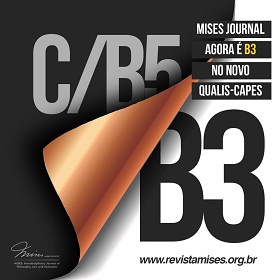Uma conexão entre a teoria do consumidor e a teoria quantitativa da moeda
uma abordagem de Cantillon
DOI:
https://doi.org/10.30800/mises.2022.v10.1450Palavras-chave:
teoria do consumidor, efeito Cantillon, TQM, lasticidade da oferta de moeda ao nível de preços ao consumidor, não neutralidade da moedaResumo
Este ensaio mostra uma conexão entre a teoria do consumidor e a teoria quantitativa da moeda, inspirada na abordagem de Richard Cantillon, no qual mudanças no estoque de moeda influenciam os níveis de preços, caracterizando a elasticidade da oferta de moeda em relação ao nível de preços ao consumidor. Assim, mudanças na oferta de moeda geram mudanças no nível de preços e, tais efeitos monetários afetam a escolha ótima do consumidor se a mudança na oferta de moeda afetar os preços de dois bens com intensidades diferentes. O governo ao expandir a quantidade de dinheiro na economia, afeta os preços relativos e, consequentemente, altera as decisões dos agentes econômicos em uma economia de mercado. Baseado em dados trimestrais americanos, 1946:04 a 2019:04, os resultados empíricos mostram que a variação do estoque de dinheiro afeta diretamente a variação ótima do consumo e indiretamente afeta a variação ótima do consumo via variação dos preços relativos, evidenciando que o dinheiro não é neutro.
Downloads
Referências
BERG, Richard van den. Richard Cantillon's Early Monetary Views? Economic Thought, v. 1, p. 48-79, 2012. Available in: https://www.semanticscholar.org/paper/Richard-Cantillon%E2%80%99s-Early-Monetary-Views-Berg/6f1943067faf73b4a565962abd7fa77ec910bf10 Acessed: 25 set. 2022.
BERG, Richard van den. Circular reasoning. Forbonnais and the intricate history of circular flow analysis in the 1750s. The European Journal of the History of Economic Thought, 2019. https://doi.org/10.1080/09672567.2019.1635180 DOI: https://doi.org/10.1080/09672567.2019.1635180
BLAUG, Mark. Why is the quantity theory of money the oldest surviving theory in economics? In: BLAUG, Mark (Org.). Quantity theory of money from Locke to Keynes and Friedman. Hants, England: Edward Elgar Publishing Limited, 1995. p. 27-49.
BORDO, Michael D. Some aspects of the monetary economics of Richard Cantillon. Journal of Monetary Economics, v. 12, n. 2 (August), p. 235-258, 1993. https://doi.org/10.1016/0304-3932(83)90002-8 DOI: https://doi.org/10.1016/0304-3932(83)90002-8
BROWN, Christopher; Thornton, Mark. How entrepreneurship theory created economics. The Quarterly Journal of Austrian Economics, v.16, n. 4, 2013. Available in: https://mises.org/library/how-entrepreneurship-theory-created-economics Acessed: 25 set. 2022.
CANTILLON, Richard. An essay on economic theory: an english translation of Richard Cantillon's essai sur la nature du commerce en général. Translated by Chantal Saucier and Edited by Mark Thornton. Auburn: The Ludwig von Mises Institute, 2010.
CHENA, Langnan; HUANG, Shoufeng. Transmission effects of foreign exchange reserves on price level: evidence from China. Economics Letters, v. 117, n. 3, December, 2012. https://doi.org/10.1016/j.econlet.2012.06.037 DOI: https://doi.org/10.1016/j.econlet.2012.06.037
DERKSEN, S.; KESELMAN, H. Backward, forward and stepwise automated subset selection algorithms: frequency of obtaining authentic and noise variables. British Journal of Mathematical and Statistical Psychology, v. 45, 1992. https://doi.org/10.1111/j.2044-8317.1992.tb00992.x DOI: https://doi.org/10.1111/j.2044-8317.1992.tb00992.x
HÉBERT, Robert F. Richard Cantillon's Early Contributions to Spatial Economics. Economica, New Series, v. 48, n. 189, p. 71-77, 1981. https://doi.org/10.2307/2552944 DOI: https://doi.org/10.2307/2552944
HONE, Joseph. Richard Cantillon, economist: biographical note. The Economic Journal, v. 54, n. 213, (Apr.), p. 96-100, 1944. https://doi.org/10.2307/2959833 DOI: https://doi.org/10.2307/2959833
HUMPHREY, T. F. Wicksell on the quantity theory. Federal Reserve Bank of Richmond. Quarterly, v. 83, n. 4, 1997. Available in: https://www.richmondfed.org/-/media/richmondfedorg/publications/research/economic_quarterly/1997/fall/pdf/humphrey.pdf Acessed: 25 set. 2022.
HURVICH, C. M.; TSAI, C. L. The impact of model selection on inference in linear regression. American Statistician, v. 44, p. 214-217, 1990. https://doi.org/10.1080/00031305.1990.10475722 DOI: https://doi.org/10.1080/00031305.1990.10475722
KOENKER, Roger; BASSETT JR., Gilbert. Regression quantilies. Econometrica, v. 46, n.1, p. 33-50, 1978. https://doi.org/10.2307/1913643 DOI: https://doi.org/10.2307/1913643
MURPHY, Antoin E. Richard Cantillon: banker and economist. The Journal of Libertarian Studies, v. 7, n. 2, Fall, 1985. Available in: https://cdn.mises.org/7_2_1_0.pdf Acessed: 25 set. 2022.
MOREIRA, Tito Belchior Silva; TABAK, Benjamin Miranda; MENDONÇA, Mario Jorge; SACHSIDA, Adolfo. An evaluation of the non-neutrality of money. Plos One, March, 2016. https://doi.org/10.1371/journal.pone.0145710 DOI: https://doi.org/10.1371/journal.pone.0145710
PESARAN, M. H.; SHIN, Y. An autoregressive distributed-lag modelling approach to cointegration analysis. Econometric Society Monographs, v. 31, p. 371-413, 1998. https://doi.org/10.1017/CBO9781139052221.011 DOI: https://doi.org/10.1017/CBO9781139052221.011
PESARAN, M. H.; SHIN, Y.; SMITH, R. J. Bounds testing approaches to the analysis of level relationships. Journal of Applied Econometrics, v. 16, n. 3, p. 289-326, 2001. https://doi.org/10.1002/jae.616 DOI: https://doi.org/10.1002/jae.616
ROECKER, E. B. Prediction error and its estimation for subset-selection models. Technometrics, v. 33, p. 459-469, 1991. https://doi.org/10.1080/00401706.1991.10484873 DOI: https://doi.org/10.1080/00401706.1991.10484873
ROTHBARD, Murray N. Economic thought before Adam Smith: an Austrian perspective on the history of economic thought. Aldershot, England: Edward Elgar Publishing, 1995. v. 1
SIERON, A. The non-price effects of monetary inflation. The Quarterly Journal of Austrian Economics, v. 20, n. 2, 2017. Available in: https://mises.org/library/non-price-effects-monetary-inflation Acessed: 25 set. 2022.
SPENGLER, Joseph J. Richard Cantillon: first of the moderns I. Journal of Political Economy, v. 62, n. 4, p. 281-295, 1954a. https://doi.org/10.1086/257535 DOI: https://doi.org/10.1086/257535
SPENGLER, Joseph J. Richard Cantillon: first of the moderns II. Journal of Political Economy, v. 62, n. 5, p. 406-424, 1954b. https://doi.org/10.1086/257574 DOI: https://doi.org/10.1086/257574
THORNTON, Mark. Was Richard Cantillon a mercantilist? Journal of the History of Economic Thought, v. 29, n. 4, 2008. https://doi.org/10.1080/10427710701666495 DOI: https://doi.org/10.1080/10427710701666495
THORNTON, Mark. Cantillon and the invisible hand. The Quarterly Journal of Austrian Economics, v. 12, n. 2, p. 27-46, 2009. Available in: https://citeseerx.ist.psu.edu/viewdoc/download?doi=10.1.1.169.3656&rep=rep1&type=pdf Acessed: 25 set. 2022.
VAN DEN BERG, R. Richard Cantillon's early monetary views? Economic Thought, v. 1, n.1, p. 48-79, 2012a. Available in: http://et.worldeconomicsassociation.org/papers/richardcantillons-early-monetary-views/ Acessed: Jan 10 2022.
VAN DEN BERG, R. Something wonderful and incomprehensible in their economy: the English versions of Richard Cantillon's essay on the nature of trade in general. European Journal of the History of Economic Thought, v. 19, n. 6, p. 868-907, 2012b. https://doi.org/10.1080/09672567.2012.735683 DOI: https://doi.org/10.1080/09672567.2012.735683
Downloads
Publicado
Como Citar
Edição
Seção
Licença
Copyright (c) 2022 MISES: Interdisciplinary Journal of Philosophy, Law and Economics

Este trabalho está licenciado sob uma licença Creative Commons Attribution 4.0 International License.

Este periódico está licenciado sob uma Creative Commons Attribution 4.0 International License.



















